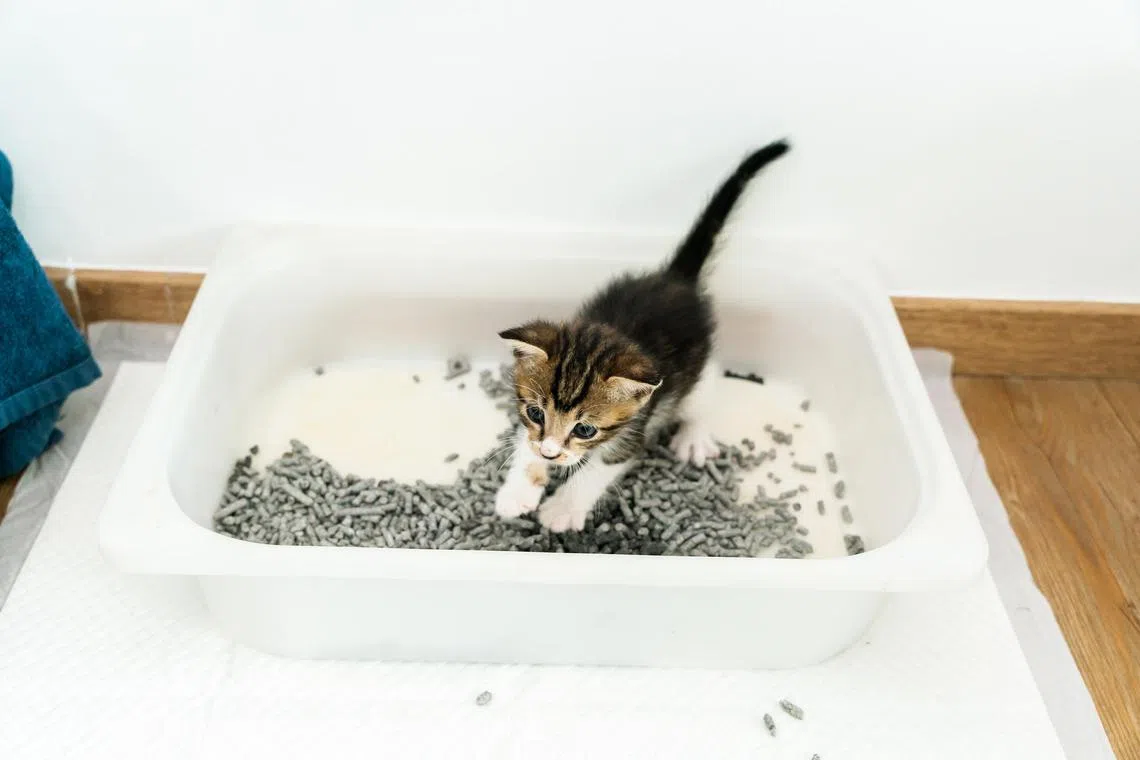Vet Talk: Busting cat myths from microchipping to vaccinations
Sign up now: Get ST's newsletters delivered to your inbox

Cat litter trays should be cleaned daily, with litter trays scrubbed weekly.
PHOTO: ANIMAL & VETERINARY SERVICE
SINGAPORE – The Cat Management Framework – under the National Parks Board’s Animal & Veterinary Service (AVS) – kicked off on Sept 1, 2024. The new scheme permits up to two cats to be kept in each HDB flat,
Those with more than what is permitted will be allowed to keep all their existing pet cats if owners get them licensed and microchipped by Aug 31, 2026.
But before you rush to get a cat, here are some myths to take note of when it comes to caring for your feline pet to ensure its health and welfare.
Myth 1: Microchipping hurts cats
Microchipping is a quick, one-time procedure. A rice grain-size microchip is inserted under the skin, with most cats having little reaction.
The unique microchip number is used to apply for the AVS licence, which helps enhance traceability and reunite lost pets with owners.
Myth 2: Cats are independent and do not need much care
Some cats enjoy living in groups, while others prefer living alone. Regardless, all have physical, behavioural and social needs.
Areas for eating, toileting, resting and scratching should be separated. Multiple litter trays should be provided at different areas for choice and to reduce stress, especially in multi-cat households.
Food and water dishes and litter trays should be cleaned daily, with litter trays scrubbed weekly.
Myth 3: Cats should roam freely outdoors
Being curious creatures, cats may get in harm’s way while exploring. Owners must be responsible for their pets’ safety and prevent falls from height, escapes and injuries.
Mesh of an appropriate size, typically with gaps smaller than 5cm, should be installed at home over windows, doors and gaps that cats may squeeze through.
Cats can thrive indoors with proper care and enrichment. This includes providing a regular routine, grooming, play, scratching surfaces, and hiding, perching and vertical climbing spaces. Owners should also learn cat body language, their emotional states and behavioural needs.
Owners must not let their pets roam freely in public places without proper control. Harnesses, leashes and carriers should be used to mitigate risks like road traffic accidents.
Myth 4: Cats can eat the same food as humans
Cats are obligate carnivores, which means they must eat meat to survive. Their systems require nutrients that are obtained adequately only through consuming animal-based protein.
Vegetarian or vegan diets are harmful to cats. Owners should provide a good quality, complete and balanced diet, appropriate for their cat’s life stage and health condition.
The World Small Animal Veterinary Association does not recommend feeding cats a raw meat-based diet due to the health risks and the lack of properly documented benefits.
Myth 5: Cats have nine lives and do not need regular vet care
Cats can live up to about 20 years. Healthy cats should have annual veterinary checks, and senior cats should be screened every six months.
Sick or injured cats should receive prompt veterinary attention. Early disease detection facilitates timely intervention that may be more effective and better received by cats.
Myth 6: Indoor cats do not need protection against parasites or infectious diseases
Contrary to popular belief, indoor cats need regular vaccinations and parasite prevention, as diseases and parasites can be brought home through people, objects and insects. Vaccinations protect against severe and life-threatening diseases and owners should discuss a plan with their veterinarians.
Parasites such as fleas, gastrointestinal worms and heartworm can cause ill health, discomfort or even death in cats. Owners should use safe products recommended by their veterinarian, as some products for other pets are toxic to cats.
Dr Olivia Lim is a veterinarian at the Animal & Veterinary Service.
Vet Talk is a fortnightly column where veterinarians offer advice on pet issues.


